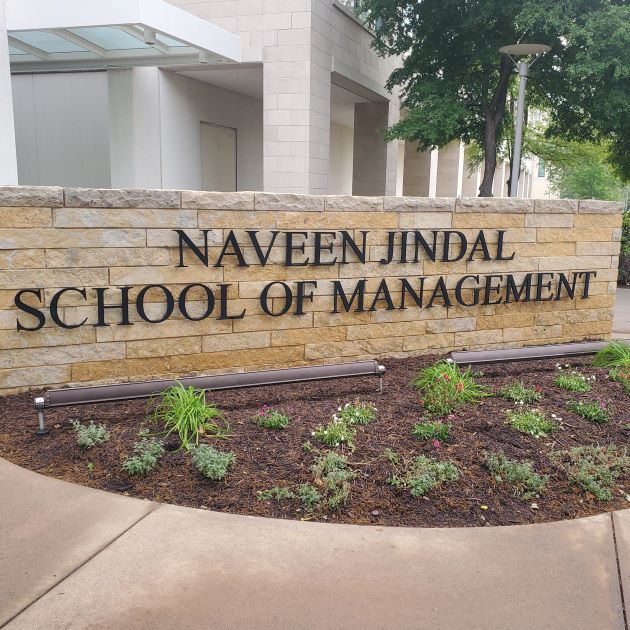Though particularly demanding, the UTD Sales Challenge is one of the most popular contests — among students and corporate supporters alike.
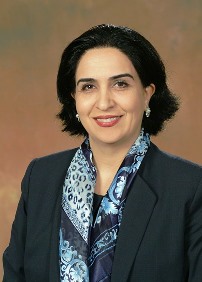
Rookie Preview, a Pro Sales Concentration competition with a cast — seemingly— of thousands, capped the fall semester Dec. 1 for students new to sales courses in the Naveen Jindal School of Management. The contests started early and culminated late, with an off-campus banquet fêting the many contestants as well as a host of sales professionals who served as judges.
As raucous and rewarding as Rookie Preview always proves to be, sales faculty member Semira Amipour, who teaches both introductory and advanced personal selling courses, sees the more difficult UTD Pro Sales Challenge as the key event of every semester.
Most Rookie Preview participants go on to compete in the Pro Sales Challenge, and “the students love it,” says Amirpour. “The corporations love it, too. If they could, they would want to see one of these events every week.”
This past fall the challenge took place in mid-October and pitted students in Advanced Personal Selling (MKT4332) against one another in a high-pressure rivalry that mimicked a real-world sales situation that took place in front of industry executives and hiring managers.
“For the students in this class, all the corporate engagement is a huge benefit,” Amirpour says.
Students competed in three areas: social selling, a reverse job fair and role-play that simulates an actual sales call.
The reverse job fair was the most visible part of the Pro Sales Challenge. Students set up 2-by-6-foot tables in the multipurpose room at the UT Dallas Visitor Center — similar to what they might do at a trade show. Rather than presenting a product or service, the students put themselves on display — with the goal of securing interviews, internships or even jobs.
Students have a better chance of standing out at a reverse job fair than they would at more conventional job fairs, according to Amirpour. Instead of queuing up at a company’s booth, employers come to them and interact one on one, giving students better opportunities to build relationships and display their personalities, talents and creativity.
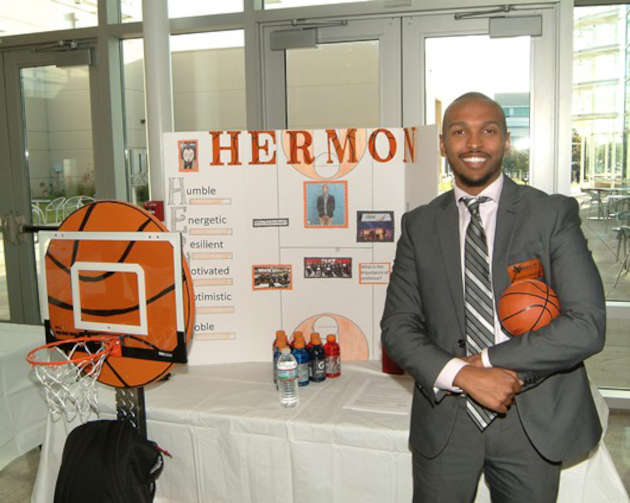
Hermon Afework, a junior marketing major, had previously competed in the spring 2017 Pro Sales Challenge, where he had secured a position with one of the employer judges. To him, this competition was “icing on the cake” and a chance to further sharpen his sales skills.
“Compared to the job fairs that many students have gone to where hundreds of students are lined up for one employer, a reverse job fair is much more personal,” he says. “You’re not just building your network; you’re building relationships with prospective employers.”
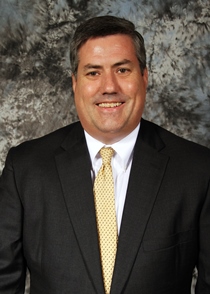
The judges, many of whom have participated in the competition multiple semesters and are on the advisory council for the Center for Professional Sales, visited the booths with an eye toward professionalism. They also considered how well the student might fit into their organization.
“I look for how well-prepared and poised the students are,” says Sharon Coleman, a Summit Intern Program manager at IBM. “For me, though, it’s an extra step in a relationship I’ve already been cultivating with the students as a campus champion for IBM. I love the creativity and the energy that I see at these competitions because those are things that are important for people who are trying to become sellers.”
“In Rookie Preview, we softball the case,” says Dr. Howard Dover, director of the Professional Sales Concentration and the Center for Professional Sales at the Jindal School. “The issues are straightforward; there are nuanced challenges, and students only have to do one event.
“The Pro Sales Challenge, on the other hand, involves not only three events, but there’s a two-round feature to it. It has a role-play that’s absolutely full of challenges. We throw lots of curve balls at them, and this separates the students who are prepared from the ones who are not.”
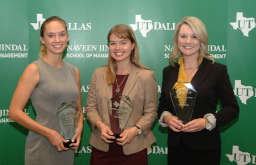
Alumni Rayyan Hingora, BS’16, and Scott Oberst, BS’16, had participated in the Pro Sales Challenge when they were marketing students and in October returned to campus to be judges for IBM. Oberst acknowledged that, as a student, he had not seen the advantages of competing that he could now see.
“I gained a ton of experience,” he says. “It’s funny, because when you’re in their shoes, you don’t really see it — it’s hard to see the light at the end of the tunnel. But, when you come out, you realize that you had a better perspective for how sales actually goes.”
Having already gone through the experience, the alums empathized with the students.
“I don’t have butterflies as a judge, but I definitely did when I was in their shoes,” Oberst says.
“I’m not going to be that guy who’s hard on them,” Hingora says. “I understand how much hard work they’ve put into it.”
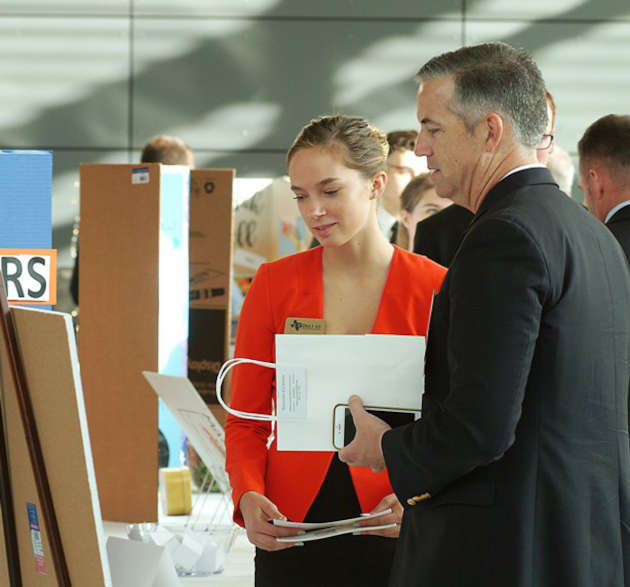
Senior marketing major Lindsey Gore, who placed third overall in the competition, was most nervous about the final, most difficult, part of the competition, the role-play. In this event, students attempted to sell Sales Navigator Enterprise — a beefed up version of LinkedIn’s sales generation tool — to representatives from Hewlett Packard Enterprise Company, a major sponsor of the competition. Prior to the event, she explained why it was on her mind.
“We don’t know exactly what their objections or their purchasing goals are, so we kind of have to go off the cuff with our research,” she said. “This is the first time I’ll have no background on what I’m going to say or what they’re going to throw at me.”
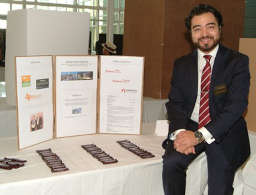
The competitors were well aware of the relationship-building opportunities presented to them at the event. Senior marketing student Geovanny Reyes explained what he saw as a distinct advantage for those willing to prepare properly.
“A lot of people have put a personal touch in their reverse job-fair presentations,” he said. “They not only show their professional side but who they are personally. I think for any employer — and for us, going out into the professional world — that’s one of the most important things.”
See the winners at:



